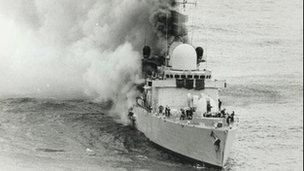HMS Sheffield Falklands anniversary: City's reaction to tragedy
- Published
The burnt-out hulk of HMS Sheffield a few days after she was abandoned
Thirty years after HMS Sheffield was hit by a missile in the Falklands conflict, a member of the ship's crew and a former local councillor recall the tragedy.
Twenty people were killed and 26 suffered blast and burn injuries when an Argentine Exocet missile hit the 4,100-tonne destroyer with a crew of 300 on board on 4 May 1982.
Chris Purcell, now chairman of the HMS Sheffield Association, was one of the survivors.
"I went down to the galley to make a cup of tea for the others on the watch and returned at about 14:00 while I was waiting for the water to boil," Mr Purcell explained.
"That 10-minute period when I returned from the galley to wait for the tea saved my life."
Dr Alan Billings was deputy leader of Sheffield City Council at the time, under the leadership of Labour's David Blunkett.
"I remember it very well," Dr Billings said. "It gradually became clear that the circumstances were really rather horrible and there was a deep sense of shock and desperate sorrow for the men and their families.
Civic link
"Everybody felt an affinity with HMS Sheffield. We had personal connections with the crew. The ship's captain, Rear Admiral Sam Salt, came to functions at Sheffield Town Hall.
"There was a civic link and I think the whole community felt personally affected - people were quiet and subdued."
HMS Sheffield was hit while carrying out a scouting mission off Port Stanley in the South Atlantic.

A survivor from HMS Sheffield's missile attack in 1982 is led away for treatment
It was the first British ship to be lost in enemy action since World War II, and the first of four British ships to be sunk by the Argentine air force in the Falklands conflict.
"We weren't expecting any threat that day," Mr Purcell said. "I was on defence watch on the starboard side of the gun direction platform.
"We saw a fireball coming towards us then heard the broadcast, 'take cover'. I took cover behind a 20mm ammunition locker."
With a range of over 20 miles, Exocets were seen as the main Argentine threat.
The missile reportedly failed to explode but penetrated deep into the control room, causing a poisonous smoke.
Black smoke
"There wasn't an explosion but a thud, then a fireball came over and black smoke," said Mr Purcell.
The burning vessel was abandoned within eight hours but the lack of damage below the water line meant HMS Sheffield did not sink immediately.
It continued to burn fiercely for another two days.
A salvage attempt failed and the ship eventually sank while being towed away from the Falklands, almost a week later.
Mr Purcell said it took a while for the full scale of the tragedy to sink in.

Twenty were killed and 26 injured when HMS Sheffield was hit by an Argentine Exocet missile
"Your immediate thoughts are with family and friends back home. It wasn't until afterwards... when we eventually abandoned ship... that it dawned on us who had been killed.
"Everyone was quiet.
"I suffer now from flashbacks and Post Traumatic Stress Disorder. The mental scars were bad for me."
Mr Purcell did not revisit the Falklands until a "humbling visit" in 2011.
- Published23 March 2012
- Published3 May 2012
- Published3 May 2012
- Published30 April 2012
- Published2 April 2012